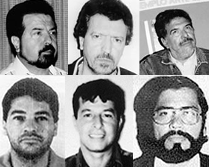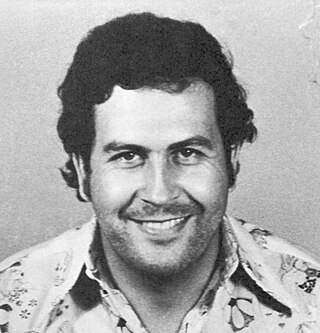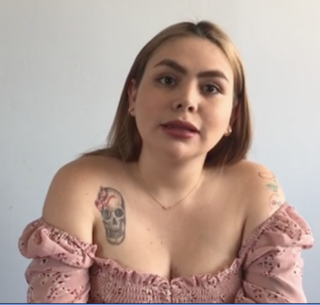Related Research Articles

The illegal drug trade, drug trafficking, or narcotrafficking is a global black market dedicated to the cultivation, manufacture, distribution and sale of prohibited drugs. Most jurisdictions prohibit trade, except under license, of many types of drugs through the use of drug prohibition laws. The think tank Global Financial Integrity's Transnational Crime and the Developing World report estimates the size of the global illicit drug market between US$426 and US$652 billion in 2014 alone. With a world GDP of US$78 trillion in the same year, the illegal drug trade may be estimated as nearly 1% of total global trade. Consumption of illegal drugs is widespread globally, and it remains very difficult for local authorities to reduce the rates of drug consumption.

The Cali Cartel was a drug cartel based in southern Colombia, around the city of Cali and the Valle del Cauca. Its founders were the brothers Gilberto Rodríguez Orejuela, Miguel Rodríguez Orejuela and José Santacruz Londoño. They broke away from Pablo Escobar and his Medellín associates in 1988, when Hélmer "Pacho" Herrera joined what became a four-man executive board that ran the cartel.

The Medellín Cartel was a powerful and highly organized Colombian drug cartel and terrorist organization originating in the city of Medellín, Colombia, that was founded and led by Pablo Escobar. It is often considered to be the first major "drug cartel" and was referred to as such; due to the organization's upper echelons and overall power-structure being built on a partnership between multiple Colombian traffickers operating alongside Escobar. Included were Jorge Luis Ochoa Vásquez, Fabio Ochoa Vásquez, Juan David Ochoa Vásquez, José Gonzalo Rodríguez Gacha and Carlos Lehder. Escobar's main partner in the organization however was his cousin Gustavo Gaviria who handled much of the cartel's shipping arrangements and the more general and detailed logistical aspects of the cocaine trafficking routes and international smuggling networks which were supplying at least 80% of the world's cocaine during its peak. Gustavo, also known as León seems to have also had a strong hand in the cartel's unprecedented acts of narcoterrorism, right alongside his cousin Pablo and was considered to be second in command of the cartel and therefore one of Colombia's most wanted men, with both him and Escobar having arrest warrants pending from other nations where their criminal activity had spread to, such as in Spain and the U.S. Meanwhile, Pablo Escobar's brother Roberto Escobar acted as the organization's accountant. The cartel operated from 1976 to 1993 in Colombia (Antioquia), Bolivia, Panama, Central America, Peru, the Bahamas, the United States, as well as in Canada.
The Russian mafia, otherwise referred to as Bratva, is a collective of various organized crime related elements originating in the former Soviet Union (FSU). Any of the mafia's groups may be referred to as an "Organized Criminal Group" (OPG). This is sometimes modified to include a specific name, such as the Orekhovskaya OPG. The "P" in the initialism comes from the Russian word for criminal: prestupnaya. Sometimes, the Russian word is dropped in favour of a full translation, and OCG is used instead of OPG.

Adler Berriman "Barry" Seal was an American commercial airline pilot who became a major drug smuggler for the Medellín Cartel. When Seal was convicted of smuggling charges, he became an informant for the Drug Enforcement Administration and testified in several major drug trials. He was murdered on February 19, 1986, by contract killers hired by the cartel.
The Norte del Valle Cartel, or North Valley Cartel, was a drug cartel that operated principally in the north of the Valle del Cauca department of Colombia, most notably the coastal city of Buenaventura. It rose to prominence during the 1990s, after the Cali and Medellín Cartels fragmented, and it was known as one of the most powerful organizations in the illegal drug trade. The drug cartel was led by the brothers Luis Enrique and Javier Antonio Calle Serna, alias "Los Comba", until its takedown in 2008 by the authorities of Colombia and Venezuela, with cooperation of the United States DEA.
Operation Panama Express is a long-running Organized Crime Drug Enforcement Task Force (OCDETF), comprising participants from the Coast Guard Investigative Service, the Federal Bureau of Investigation, Immigration and Customs Enforcement (ICE), the Drug Enforcement Administration, and the United States Attorney's Office for the Middle District of Florida.
Walter Douglas is an alleged Scottish drug trafficker and organised crime figure, dubbed the Tartan Pimpernel by the press, who is reportedly one of the richest in the United Kingdom with an estimated worth of £20 million. He was allegedly wanted in at least three countries on drug trafficking and gun running charges as of 2003, and Douglas was reported to have had ties to numerous international criminal organisations in Europe and North America as the head of the Delta crime syndicate. But in fact nothing has ever been proved against Douglas. In October 2013 there were no longer any warrants out against him and he staunchly maintained his innocence to a British journalist

Jorge Luis Ochoa Vásquez is a Colombian former drug trafficker who was one of the founding members of the notorious Medellín Cartel in the late 1970s. The cartel's key members were Pablo Escobar, Carlos Lehder, José Gonzalo Rodríguez Gacha, Gustavo Gaviria, Jorge Ochoa, and his brothers Juan David and Fabio.

Juan Carlos Ramírez Abadía is a drug trafficker who, until his capture, was one of the leaders of the North Valley Cartel, who was wanted on drug smuggling, murder and RICO charges in the United States of America. In addition to the trafficking of cocaine, it is believed Ramírez also participated in money laundering and trafficking of heroin. Through Ramírez’ illegal enterprise, he has amassed a fortune estimated at $1.8 billion by the US Department of State. He has been cited as "... one of the most powerful and most elusive drug traffickers in Colombia" by Adam J. Szubin, Director of the U.S. Department of the Treasury's Office of Foreign Assets Control (OFAC).

Banged Up Abroad is a British documentary/docudrama television series created by Bart Layton that was produced for Channel 5 and that premiered in March 2006. Most episodes feature stories of people who have been arrested while travelling abroad, usually for trying to smuggle illegal drugs, although some episodes feature people who were either kidnapped or captured while they were either travelling or living in other countries. Some episodes have featured real-life stories that first became well known when they were made the subject of a film: films that have been 're-made' in this way include Midnight Express, Goodfellas, The Devil's Double, Argo, Mr Nice and, to a lesser extent, Casino. A few episodes have focused on undercover infiltrations of criminal syndicates by law enforcement agents or individuals recruited by them.
The Sonora Cartel, also known as Caro Quintero Organization, was a Mexico based criminal cartel. Upon the cartel's disintegration, its leaders were incorporated into the Tijuana Cartel and Sinaloa Cartel.

A narco-submarine is a type of custom ocean-going, self-propelled, semi-submersible or fully-submersible vessel built by drug smugglers.
Max Mermelstein was an American drug smuggler for the Medellín Cartel in the late 1970s and early 80s, who later became a key informant against the organization. In the words of James P. Walsh, the U.S. Attorney for Los Angeles CA, Mermelstein "was probably the single most valuable government witness in drug matters that this country has ever known." He became a "weapon for the government." Reputed to have smuggled 56 tons of cocaine worth $12.5 billion into the United States, Mermelstein was described by his attorney Tom Johnston as "just a nice Jewish guy who got into the wrong industry."
A drug lord, drug baron, kingpin, or lord of drugs is a type of crime boss, who is in charge of a drug-trafficking network, organization, or enterprise.

Drug barons of Colombia refer to some of the most notable drug lords which operate in illegal drug trafficking in Colombia. Several of them, notably Pablo Escobar, were long considered among the world's most dangerous and most wanted men by U.S. intelligence. "Ruthless and immensely powerful", several political leaders, such as President Virgilio Barco Vargas, became convinced that the drug lords were becoming so powerful that they could oust the formal government and run the country.
Jaime Guillot Lara was a Colombian drug and weapons smuggler, and international underworld facilitator, indicted for his involvement in the trafficking of 2.5 million pounds of marijuana, 25 million methaqualone tablets, and 80 pounds of cocaine to the United States between 1977 and 1981.
Maritime cocaine smuggling refers to the practice which involves the smuggling of cocaine between borders via maritime means. According to the United Nations Office on Drugs and Crime (UNODC), there are an estimated 18 million users of cocaine globally. Approximately 70-80% of cocaine is at some point smuggled across the ocean, originating from South America. Cocaine remains the "highest value criminal commodity for transnational organised crime", motivating the criminal organisations responsible for maritime smuggling practices. Maritime cocaine smuggling is therefore an ongoing international issue, as criminal organisations are finding new and innovative ways of smuggling cocaine and go undetected by authorities.

The cocaine boom was a stark increase in the illegal production and trade of the drug cocaine that first began in the mid to late 1970s before then peaking during the 1980s. The boom was the result of organized smugglers who imported cocaine from Latin America to the United States, and a rising demand in cocaine due to cultural trends in the United States. Smuggling rings of Cuban exiles organized trade networks from Latin America to Miami that streamlined the import of cocaine to the United States. Americans also began favoring less of the drugs popular in the 60s counterculture such as marijuana and LSD, and instead began to prefer cocaine due to a mystique of prestige that was developing around it. This increase in cocaine trade fueled the rise of the crack epidemic and government sponsored anti-drug campaigns.

Cristel Yariella Gomez Espinoza, alias "La Reina del Sur", is an alleged narcotics trafficker who is said to have operated drug smuggling operations in Costa Rica before her capture in 2019. She stands accused in a Costa Rican court of trafficking illicit substances and guns from South America through the Panamanian border with Costa Rica.
References
- ↑ See generally In re Apache Trading Group, Inc., 210 B.R. 869 (Bankr. S.D. Fla. 1997), at .
- ↑ Navarro, Mireya (1997-03-07). "Russian Submarine Drifts Into Center of a Brazen Drug Plot". The New York Times. ISSN 0362-4331 . Retrieved 2018-04-23.
- ↑ Timothy K. Smith (December 25, 2014). "5 business calamities that delivered world-class entertainment". Fortune.
- ↑ "Redfellas". The Economist . Vol. 342, no. 8008. March 15, 1997.
- ↑ "Meet Leonid Fainberg, The Ultimate Ukrainian Mobster". New Statesman . Kiev, Ukraine. October 14, 2012. Archived from the original on December 25, 2012. Retrieved February 12, 2013.
- ↑ OPERATION ODESSA : The true story of a Jewish Russian Mobster, Cuban Spy, Miami Playboy, who hustled the Russian Mafia, the Cali Cartel, and Pablo Escobar.